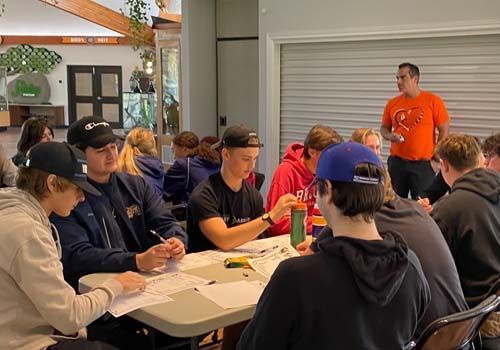Student Services
Courses


Courses
Grade 12 Sciences
SBI4U - Biology (University):
This course provides students with the opportunity for in-depth study of the concepts and processes that occur in biological systems. Students will study theory and conduct investigations in the areas of biochemistry, metabolic processes, molecular genetics, homeostasis, and population dynamics. Emphasis will be placed on the achievement of detailed knowledge and the refinement of skills needed for further study in various branches of the life sciences and related fields.
SES4U Space & Earth (University):
This course develops students’ understanding of Earth and its place in the universe. Students will investigate the properties of and forces in the universe and solar system and analyze techniques scientists use to generate knowledge about them. Students will closely examine the materials of Earth, its internal and surficial processes, and its geological history, and will learn how Earth’s systems interact and how they have changed over time. Throughout the course, students will learn how these forces, processes, and materials affect their daily lives. The course draws on biology, chemistry, physics, and mathematics in its consideration of geological and astronomical processes that can be observed directly or inferred from other evidence. Prerequisite: Grade 10 Academic Science
SNC4M - Medical Science - (College/University):
This course enables students, including those pursuing postsecondary programs outside the sciences, to increase their understanding of science and contemporary social and environmental issues in health-related fields. Students will explore a variety of medical technologies, pathogens and disease, nutritional science, public health issues, and biotechnology. The course focuses on the theoretical aspects of the topics under study and helps refine students’ scientific investigation skills.
SCH4C - Chemistry (College):
This course enables students to develop an understanding of chemistry through the study of matter and qualitative analysis, organic chemistry, electrochemistry, chemical calculations, and chemistry as it relates to the quality of the environment. Students will use a variety of laboratory techniques, develop skills in data collection and scientific analysis, and communicate scientific information using appropriate terminology. Emphasis will be placed on the role of chemistry in daily life and the effects of technological applications and processes on society and the environment.
SCH4U - Chemistry (University):
This course enables students to deepen their understanding of chemistry through the study of organic chemistry, the structure and properties of matter, energy changes and rates of reaction, equilibrium in chemical systems, and electrochemistry. Students will further develop their problem-solving and investigation skills as they investigate chemical processes, and will refine their ability to communicate scientific information. Emphasis will be placed on the importance of chemistry in everyday life and on evaluating the impact of chemical technology on the environment.
SPH4C - Physics (College):
This course develops students' understanding of the basic concepts of physics. Students will explore these concepts with respect to motion; mechanical, electrical, electromagnetic, energy transformation, hydraulic, and pneumatic systems; and the operation of commonly used tools and machines. They will develop their scientific investigation skills as they test laws of physics and solve both assigned problems and those emerging from their investigations. Students will also consider the impact of technological applications of physics on society and the environment.
SPH4U - Physics (University):
This course enables students to deepen their understanding of physics concepts and theories. Students will continue their exploration of energy transformations and the forces that affect motion, and will investigate electrical, gravitational, and magnetic fields and electromagnetic radiation. Students will also explore the wave nature of light, quantum mechanics, and special relativity. They will further develop their scientific investigation skills, learning, for example, how to analyse, qualitatively and quantitatively, data relating to a variety of physics concepts and principles. Students will also consider the impact of technological applications of physics on society and the environment.